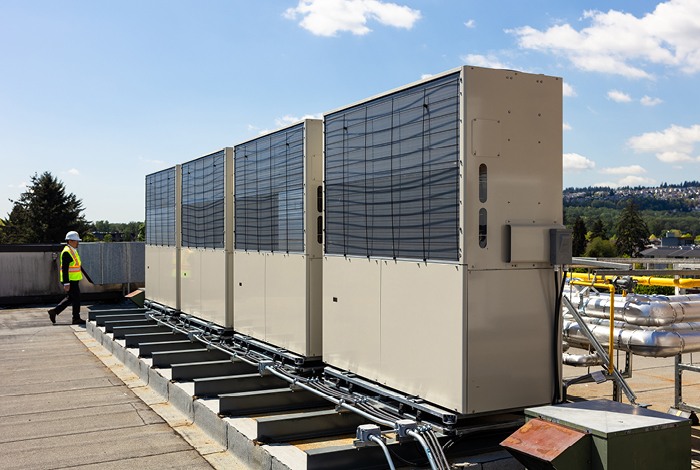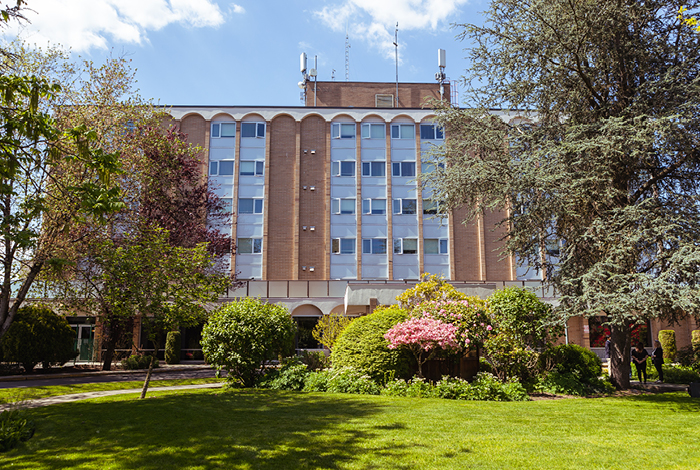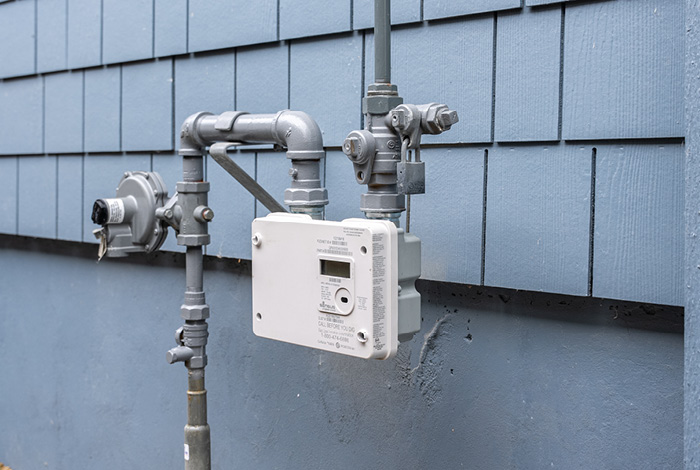Port Coquitlam seniors care home tests the efficiency of gas heat pumps
October 25, 2024
Before we create rebate programs on new energy-related technologies, our innovative technologies team tests them in real homes and businesses to evaluate the energy-saving potential, reliability and customer acceptance of the technology. One of our current pilot programs, which started in May 2023, is testing gas engine-driven heat pumps in commercial buildings.
What are gas engine-driven heat pumps?
An innovation in heating equipment for commercial buildings, these units use gas input to capture heat from the ambient outdoor air and then transfer it indoors to provide space heating, hot water and/or ventilation. They can also be used for supplemental cooling. By transferring heat, their energy output is greater than their energy input, so these heat pumps can achieve efficiencies of more than 100 per cent, 1 helping to reduce energy use and associated greenhouse gas (GHG) emissions, as well as monthly energy costs. In fact, according to Yanmar, their gas engine-driven heat pump may achieve up to 140 per cent efficiency2 while a standard boiler is around 80 per cent efficient.
The pilot will provide more concrete data on how much these heat pumps can reduce building energy consumption and associated emissions as well as heating costs.
Another benefit for customers: these heat pumps expand cooling capacity by using a building’s existing piping and ducting system, so no ductwork upgrades are required to accommodate it.
This is a new way to potentially increase energy efficiency and reduce associated GHG emissions. Customers can also opt to designate up to 100 per cent of their gas usage as Renewable Natural Gas.3 The more RNG added to the North American gas system, the less conventional natural gas is needed, thereby reducing the use of fossil fuels and overall GHG emissions.
Learn more about gas heat pumps.

Gas engine-driven heat pumps installed at Hawthorne Seniors Care Community.
Seeking energy-savings for a nonprofit seniors housing community
Some of the current gas engine-driven heat pump pilot participants include Surrey Memorial Hospital’s Shirley Dean Pavillion, as well as a couple of BC Care Providers Association (BCCPA) member sites who installed these units in assisted living, long-term care and seniors care community buildings. Hawthorne Seniors Care Community in Port Coquitlam, B.C., is one such site—they had four Yanmar gas engine-driven heat pumps installed and received a FortisBC rebate close to $195,000. FortisBC also covered the cost of installing the equipment, investing $670,000 in total at this site. We asked Hawthorne’s chief executive officer, Elissa Gamble, to tell us about their experience.

Elissa Gamble, CEO of Hawthorne Seniors Care Community
How did Hawthorne learn about this pilot program opportunity?
“We found out about this pilot program through our participation in BCCPA’s Energy Savings Program, where we were paired with an energy specialist to support us in making energy-efficient decisions for our building. The energy specialist brought the pilot to our attention.
As a registered non-profit charitable organization, we would not have been financially able to acquire such innovative technology without this pilot. The pilot and the FortisBC rebate made it possible, and the impact of this opportunity will touch many lives for many years.”
Why do you believe gas engine-driven heat pumps are a good option for your seniors’ care home?
“Reliability is critical for us to ensure the comfort and safety of our residents and all the people we care for. This innovative technology not only brings more reliability, but also improves energy efficiency [compared with Hawthorne’s previous system, consisting of a central boiler system and chiller]. This helps us save money so we can spend it on care and service, where it matters most.
Having secure and reliable heating and cooling isn’t just a matter of comfort in a care community. It is a matter of safety and fundamental to good care. We take that responsibility very seriously and this pilot was very helpful in adding new technology and improved temperature security. These heat pumps will make a very big difference in the quality of life for the people we care for today and for many years to come.”

Hawthorne Seniors Care Community in Port Coquitlam
What has your experience been like, participating in a FortisBC innovative technologies pilot program?
“It was a big project and has involved many people, but the contractors used by FortisBC (to install the heat pumps) instilled confidence and worked very well with our staff to make the project go very smoothly.
We’re very interested in participating in more programs with FortisBC. Our experience working with them has been excellent as well as our experience working with any of the contractors they used for this project. I have nothing but great things to say.
I would strongly encourage any other organization to absolutely participate in a pilot program with FortisBC.”
Successful past pilot programs
Learn about pilot program successes that were turned into ongoing rebate and incentive programs for our customers.
Why we believe pilot programs are a key part of an energy-efficient future
“As part of our mission to help customers lower GHG emissions, we’re finding and testing innovative energy systems,” says Mehmud Iqbal, FortisBC’s technology and market development program manager. “We want to make sure our customers have effective choices for heating their homes and businesses. “In some cases, a gas heat pump may be the most cost-effective and least complex option. FortisBC’s pilot programs evaluate energy savings of equipment like this in real-world settings, gathering customer feedback along the way. We share this information with others in the field and develop rebate programs to encourage customers to install proven, energy-efficient equipment.”
Pilot program participants are leading the way in testing new and innovative technologies that have the potential to help reduce energy use and GHG emissions while also helping influence the future of energy use and efficiency in B.C. If you, your organization or business are interested in learning about upcoming pilot programs you might be eligible to participate in, sign up for our mailing list.
1Coefficient of performance (COP) and gas usage efficiency (GUE) results of more than 1.0 were achieved in Robur A gas absorption heat pump systems with dynamic controls, as recorded by Building Energy Solutions (BES) Ltd. in its Measurement & Verification report for the gas absorption heat pump pilot, phase 3 and 4, September 9, 2021.
2https://www.yanmar.com/global/energy/ghp/air_to_water/ - 1.41 COP means approximately 140 per cent efficiency.
3Renewable Natural Gas (also called RNG or biomethane) is produced in a different manner than conventional natural gas. It is derived from biogas, which is produced from decomposing organic waste from landfills, agricultural waste and wastewater from treatment facilities. The biogas is captured and cleaned to create RNG. When RNG is added to North America’s natural gas system, it mixes with conventional natural gas. This means we’re unable to direct RNG to a specific customer. But the more RNG is added to the gas system, the less conventional natural gas is needed, thereby reducing the use of fossil fuels and overall greenhouse gas emissions.



